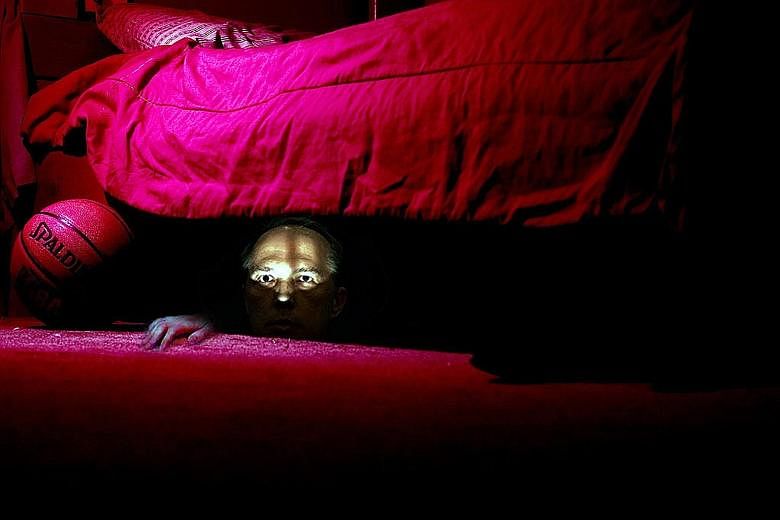CENSORING PHOTOS A BAD IDEA
Removing unflattering photos of yourself from the Internet once they have been put up is an endeavour fraught with peril.
As a guiding principle, it is often much easier, and healthier for your mind, to leave things well alone and wait for things to blow over.
Australian politician Peter Dutton found this out the hard way last week when he tried to take down a snap by Fairfax photographer Alex Ellinghausen.
The photo, which showed Mr Dutton looking slightly sinister as he emerged from the shadows at a press conference, was posted on Twitter by Mr Ellinghausen's colleague, Ms Stephanie Peatling, with the caption "Eek".

She said Mr Dutton's office, which took "considerable umbrage with it and most strongly protested its presence on the socials", then asked her to take it down.
She did so, on condition that she could tell her readers why.
But it was too late. Twitter users, offended on Ms Peatling's behalf, jumped at the opportunity to practise their photo editing skills on the unfortunate immigration minister.
"This photo? It's ok, I have a copy and I'm happy to share it far and wide," said one user to Ms Peatling.
Mr Dutton soon found himself plastered all over the Internet, in various uncompromising positions and poses. From heroically holding up a light sabre, to peeking out from under the bed, to accompanying three clones of himself in a spoof of rock band Queen's iconic album cover, Mr Dutton's image indeed spread "far and wide".

It was even trending on Reddit's "photoshopbattles" thread, which challenges users to come up with their most creative entries.
Shortly after, major news outlets picked it up. If people had not seen Mr Dutton's photo before, they would have done so now, much to his chagrin.
Mr Dutton's gaffe is the latest in the long list of social media missteps among the rich and powerful.
The University of California at Davis recently made headlines when it tried to censor, or "scrub", Web references to an incident in 2011 where a campus police officer was filmed nonchalantly spraying student protesters with pepper spray. According to the Sacramento Bee, UC Davis paid a communications firm at least US$175,000 (S$238,000) to remove negative online postings which "damaged" the reputation of the university and its chancellor.
In 2013, American singer Beyonce Knowles' publicist told media company Buzzfeed to take down unflattering photos shot during the Super Bowl half-time show. In response, Buzzfeed promptly posted a screen grab of the e-mail, alongside a gallery of the "offensive" photos, in an online article titled: "The photos Beyonce doesn't want you to see."

It went viral. Media sites like Deadspin published an easy-to-use template for netizens to manipulate the images, while SB nation has since put out a yearly reminder about the incident.
The unintended consequence of having information go viral after attempts at censorship has been termed The Streisand Effect.
In 2003, singer Barbra Streisand sued a photographer for US$10 million after an aerial photo of her Californian mansion was inadvertently made available.
The photographer, an environmental activist, was merely trying to document coastal erosion.
A US judge threw out the suit and Streisand now has the dubious honour of having a phenomenon named after her.
So, the next time you come across an uncomplimentary photo of yourself online, think hard about forgiving and forgetting.
It's highly possible that somebody somewhere has already downloaded a copy of that image onto his smartphone.
But, unless you are a celebrity, chances are no one beyond your immediate group of friends will bother too much beyond a couple of laughs.
-
NOTABLE TRENDS
#HAVINGAPARTY: Leicester City's historic English Premier League win triggered an 86 per cent increase in Twitter activity in the UK alone. One tweet by squad member Christian Fuchs of the team's celebration was retweeted more than 220,000 times.
KABALI: The teaser trailer for the upcoming Indian film is a hit on YouTube. It was released on April 30, and has so far been watched almost 14 million times. It stars Indian actor Rajinikanth and is slated for release this month.
#SADIQKHAN: After a hard-fought campaign, Mr Sadiq Khan becomes the first Muslim mayor of London. The Labour lawmaker takes over the reins from Mr Boris Johnson, who has run the city of 8.6 million people for eight years.
FLYING HIGH WITH KINDNESS
A kind deed goes a long way, as Singapore Airlines stewardess Karen Choong has found out.
During a 12-hour flight from Singapore to Frankfurt, Ms Choong went the extra mile for a 92-year-old woman passenger from Slovenia named Draga.
Draga, whose husband died five years ago, was making an annual trip to visit her sister.
Unfamiliar with technology, she was having difficulty turning on the lights to check her glucose level during the flight. At one point, she accidentally injected too much insulin and, as a result, had low blood sugar levels.
Fellow passenger Shazy Tan noticed her plight and her call for assistance was answered by Ms Choong, who gave Draga fruit juice and an apple. "Draga could not bite into the hard apple and I was touched when Karen excused herself to grab a pair of gloves and a knife to cut the apple into bite-sized pieces," recounted Ms Tan in a Facebook post last Thursday that has since attracted more than 17,000 likes, comments and shares.
"On her knees in her SQ kebaya, she patiently assisted Draga, even wanting to feed her. Draga shyly declined and was appreciative of Karen's kind gesture."
Ms Choong then asked Ms Tan to help monitor Ms Draga, and to inform her if the situation worsened. Said Ms Tan: "Karen did not have to do what she did. She has acted out of such kindness without expecting anything in return. She, at least, deserves to read about how her actions have affected Draga's life and mine too."
Within hours of the post going up, one of Ms Choong's friends tagged her in the post. Overwhelmed by the messages of support, Ms Choong subsequently penned her thoughts a day later on her Facebook page. "Thank you all fellow Singaporeans for being so kind with your words and all. Let's make a big change in our little country and love each other as though we live for one another," she said.


